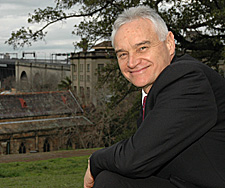 The revamped Mission Board is set to give Sydney Anglicans a long-term vision and help parishes think big beyond the 2012 Diocesan Mission deadline.
The revamped Mission Board is set to give Sydney Anglicans a long-term vision and help parishes think big beyond the 2012 Diocesan Mission deadline.
Mission Executive, Les Gray (pictured) and Archbishop Peter Jensen presented their plans for the future of Sydney Diocese to Synod last night.
"The Mission Board seeks to bend the resources of the Diocese to support and enable parishes to achieve the Mission," Dr Jensen said.
"We are seeking to remove roadblocks to mission, support initiatives and enhance mission partnerships."
Mr Gray, who has a background in strategic management at Fairfax, revealed the five strategy groups that will help resource parishes with the tools and strategies for implementing the Diocesan Mission.
The five strategy groups will be led by key clergy and lay leaders. The groups have the targets of increasing newcomers, creating new evangelistic entities, radical diocesan and parish reform, changing the culture of society and developing resources.
"The strategy groups are important as they will be consulting across the Diocese and listening to people as they look for ideas for implementing their planning processes," Mr Gray said.
Mr Gray cast a vision for a series of yearly action plans from next year through to 2013 and then encouraged Synod members to imagine what the Mission might look like beyond 2013.
Mr Gray also revealed that there are plans to purchase property in key areas, reinvent parishes and develop successful leaders.
"We want to support parishes to become training parishes," Mr Gray said.
"We want to ensure that every Sydney resident has an opportunity to hear and respond to the good news of Jesus and the answer is a Christian fellowship where they are nurtured discipled and equipped to be a follower of Jesus. That results in the transformation of lives, society and the world."
Archbishop Peter Jensen urged to Synod members to stay committed to seeing at least 10 per cent of the Diocese in Bible-based churches in ten years.
"That's 400,000 people. I have always said this work quite impossible unless we see it as entirely based on the sovereign work of God," Dr Jensen said.
"However, 10 per cent forces us to look into our parish, into our community. It forces us to multiply fellowships, congregations and churches."
Cloning opposed
The Synod affirmed its opposition to the practice of therapeutic cloning and any relaxation of current restrictions on research involving human embryos.
This resolution is timely as the legislation is soon to be debated by the Senate of Australia.
Bishop Ivan Lee spoke to the motion, recognising the need for research to find cures and prevent suffering caused by disease, but stressing that fertilisation for the purposes of destroying life for research failed to recognise the purpose that God assigns to human life.
"The mere fact that we can do something does not mean we ought to do that something. We encourage research but not at any cost," Bishop Lee said.
Moore College Vice Principal Michael Hill said the Diocese's Social Issues Executive had researched this issue in great depth in coming to its conclusion on the issue of embryonic stem cell research.
"We are not against adult stem cell research which is actually far more successful than embryonic stem cell research," Mr Hill said.
Synod clarifies chaplaincy
The rector of North Ryde, the Rev Stephen Bligh put forward a motion seeking to recognise the work of Anglicare chaplains, acknowledge the current funding levels and seek further funding through Standing Committee.
Synod affirmed the strategic importance of Anglicare chaplaincy to the Diocesan Mission in reaching people beyond parish structures and affirmed Anglicare's commitment to funding chaplaincy. However, Synod also affirmed that it was not the role of the Standing Committee to allocate funds in this way.
Anglicare council member Bishop Robert Forsyth said the council did not support the motion.
"I appreciate the heart of the motion but I do not think we should cherry pick a need and tell Standing Committee what they must do," he said.
Anglicare CEO Peter Kell said the Synod Appropriation and Allocations Ordinance was not the way to fund chaplaincy at this time.
"It's improper for Synod to act in a piecemeal way because at this stage we have no clue as to what other priorities there might be for the money," Mr Kell says.
Mover of the motion, the rector of North Ryde, the Rev Stephen Bligh says he was pleased to be "a cat amongst the pigeons'.
"It was good to help bring chaplains into the public arena by moving this motion."























